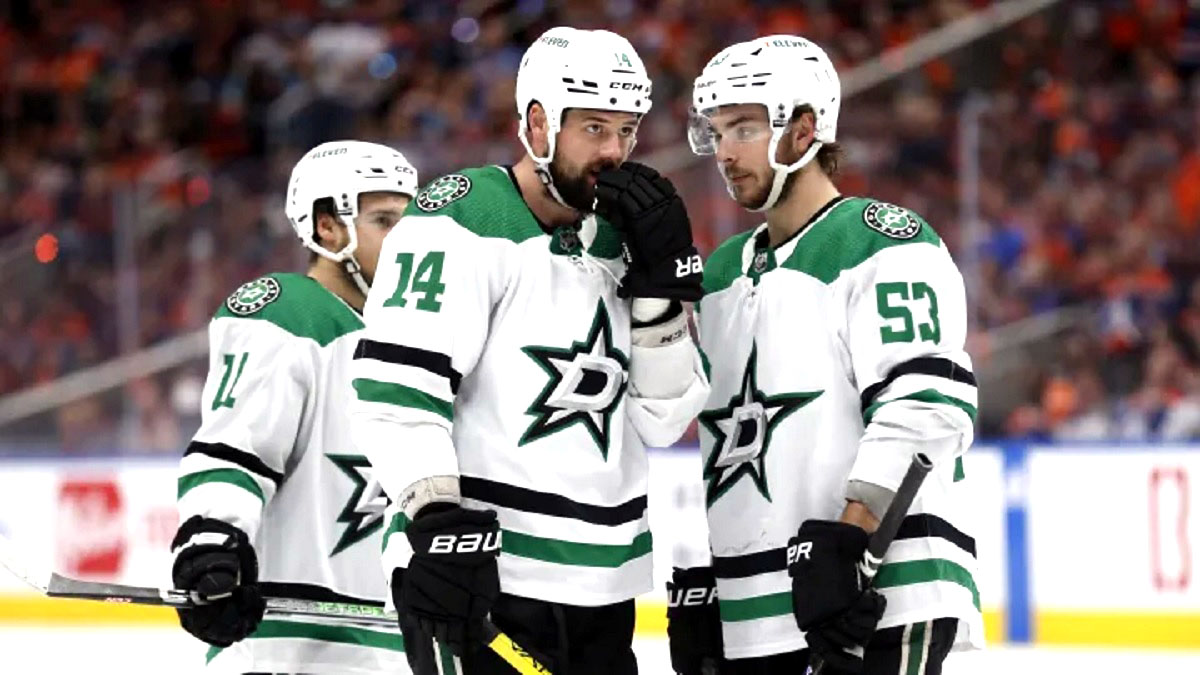While the primary grievance and possible psychological barrier for the Dallas Stars might be their offensive execution, there exist defensive modifications that could assist them in prevailing in this series.

Defensive Adjustments to Ignite the Dallas Stars’ Offense
Context and Strategic Importance
To concisely encapsulate the most prominent offensive deficiencies, the absence of Powerplay urgency and suboptimal puck movement in the low zone has permitted Edmonton to maintain a slightly passive stance, confronting each initial Dallas attack without overcommitting. Additionally, Dallas’s struggle to engage in high-danger areas—owing to the difficulty in penetrating these zones—has compelled them to attempt shots from a distance, facilitating easier saves for Stuart Skinner, among other concerns.
Overall, offensive adjustments are feasible, yet two defensive shortcomings have constrained the Stars’ offensive leverage: their ‘first man back’ conundrum and the consideration of handedness in both offensive and defensive zones.
The adage ‘the best offense is a good defense’ is oft-repeated and occasionally disregarded, yet it holds true in ice hockey for several reasons, including the following:
- Odd-man rushes (counter-attacks) constitute some of modern ice hockey’s most potent offensive maneuvers.
- Maintaining a position behind the puck enables a defensive team to rarely be caught off-guard and capitalize on turnovers due to advantageous body positioning.
A robust defense is proactive in turnovers because the majority of the team faces the attacking net when playing behind the puck, providing forward momentum without necessitating a 180-degree turn to initiate play. Conversely, from the opponents’ perspective, they face backward without momentum, as they were oriented towards their attacking net, unprepared for a turnover.
This typical post-turnover scenario often grants counter-attacking teams the time and leverage to create chaos. Dallas has excelled in this aspect throughout the season, efficiently transitioning from defense to offense.
Don Waddell, recently appointed by the Columbus Blue Jackets as President of Hockey Operations, General Manager, and Alternate Governor, remarked on team rebuilding—a sentiment applicable to making in-series adjustments as well:
“The Stars can refine their defensive zone strategies, irrespective of inconsistent goal-scoring from their forwards, except for Wyatt Johnston. The following defensive recommendations could potentially unlock the Stars’ offensive capabilities:”
First Man Back?
In traditional minor hockey, forwards backchecking typically see the centerman rushing back to defend the lower defensive zone as part of their standard coverage. Consequently, wingers who arrive first handle the initial attacking threat before assuming their standard winger positions.
For the Dallas Stars, the road ahead is fraught with challenges, but also rife with opportunities for growth and adaptation. Reflecting on past triumphs and setbacks provides a roadmap for necessary strategic adjustments. The Stars have shown resilience and adaptability throughout the season, and now is the time to harness those qualities to their fullest extent.
Embracing Tactical Flexibility
One of the Stars’ greatest strengths has been their ability to adapt on the fly. Throughout the regular season, they’ve demonstrated an aptitude for modifying their play style to exploit opponents’ weaknesses. This tactical flexibility must be their cornerstone moving forward.
Against a dynamic and high-octane team like the Edmonton Oilers, the Stars cannot afford rigidity. They need to be unpredictable, leveraging varied offensive schemes to keep the Oilers’ defense on its heels. Integrating more aggressive forechecking and diverse zone entries can disrupt Edmonton’s defensive rhythm and create more scoring opportunities.

Reinforcing Defensive Discipline
Defensive discipline will be paramount. The ‘first man back’ policy, while effective in theory, requires unwavering commitment and execution. Every forward must internalize the necessity of this approach, especially against a team that thrives on speed and transition play like Edmonton. Reinforcing the importance of back pressure and responsible positioning can alleviate the burden on the defensive core and reduce the frequency of high-danger chances against.
Moreover, the Stars should consider rotating their defensive pairings to ensure fresh legs and sharper decision-making throughout the game. Utilizing a deeper defensive rotation can also distribute ice time more evenly, preventing fatigue and maintaining a high level of defensive integrity.
Cultivating Offensive Creativity
Offensively, the Stars must rekindle their creativity. Sticking to conventional plays and predictable patterns will only serve to fortify the Oilers’ defensive strategies. Instead, embracing unconventional plays, deceptive passing, and quick puck movement can break through Edmonton’s defensive lines.
Incorporating more cross-ice passes, rapid one-timers, and utilizing the point more effectively can create chaos in front of the net and increase scoring chances. Players like Wyatt Johnston and Logan Stankoven have shown flashes of brilliance with their improvisational skills—these attributes should be encouraged and integrated into the team’s overall offensive strategy.
Maximizing Special Teams
Special teams play is often the deciding factor in tightly contested playoff series. The Stars’ PowerPlay, which has struggled with urgency and puck movement, needs a revitalized approach. Emphasizing quick, decisive passes and creating shooting lanes can improve efficiency. Ensuring that the PowerPlay units are unpredictable and varied in their setups can keep the Oilers’ penalty kill on the defensive.
Similarly, the penalty kill must remain vigilant and aggressive. Preventing the Oilers from setting up their lethal power play, especially with players like Connor McDavid and Leon Draisaitl, requires constant pressure and strategic positioning to force turnovers and clear the puck effectively.
Psychological Fortitude
Beyond physical and tactical adjustments, the mental aspect of the game cannot be overlooked. Playoff hockey is as much about psychological resilience as it is about skill and strategy. The Stars must cultivate a mindset of unwavering determination and confidence. Leaders within the team, such as Jamie Benn and Joe Pavelski, play a crucial role in fostering this mental fortitude, setting the tone with their experience and poise under pressure.
Conclusion
The path to victory in the Western Conference Finals is arduous and requires the Dallas Stars to embody adaptability, discipline, and creativity. Strategic adjustments, especially in defensive accountability and offensive innovation, are critical. By embracing these changes and maintaining psychological resilience, the Stars can transcend their current challenges and emerge victorious.
As the series progresses, the Stars’ ability to internalize and execute these adjustments will determine their fate. They have the talent and potential to overcome the Oilers, but it will require a collective effort, a commitment to strategic evolution, and an unyielding belief in their capacity to succeed.
The Dallas Stars are on the cusp of greatness, and with the right adjustments and mindset, they can seize their moment and keep their playoff hopes alive.